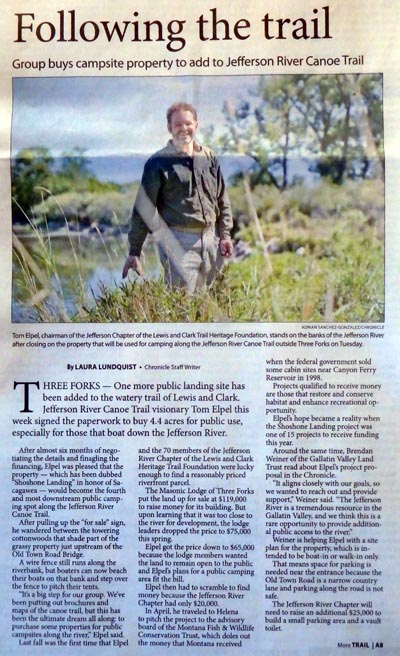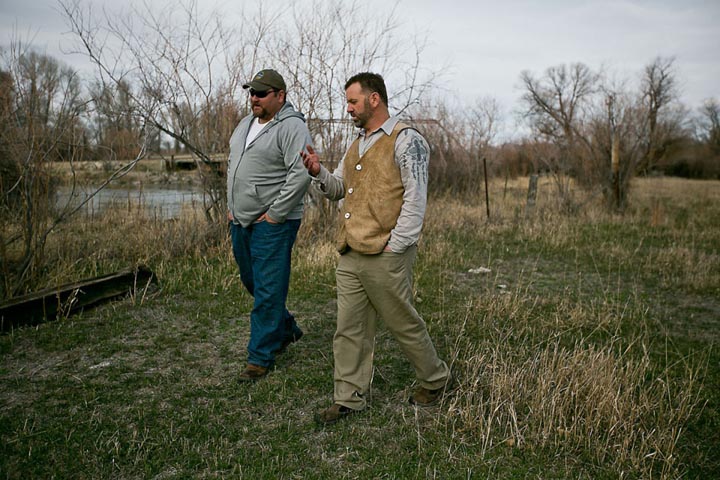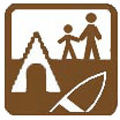Following the trail
Group buys campsite property to add to Jefferson River Canoe Trail
Story by Laura L. Lundquist for the Bozeman Daily Chronicle, 09/04/2014
|

|
Article printed in the Bozeman Daily Chronicle. |
THREE FORKS - One more public landing site has been added to the watery trail of Lewis and Clark.
On Tuesday, Jefferson River Canoe Trail visionary Tom Elpel signed the paperwork to buy 4.4 acres for public use, especially for those that boat down the Jefferson River.
After almost six months of negotiating the details and finagling the financing, Elpel was pleased that the property - which has been dubbed "Shoshone Landing" in honor of Sacagawea - would become the fourth and most downstream public camping spot along the Jefferson River Canoe Trail.
After pulling up the "for sale" sign, he wandered between the towering cottonwoods that shade part of the grassy property just upstream of the Old Town Road Bridge.
A wire fence still runs along the riverbank, but boaters can now beach their boats on that bank and step over the fence to pitch their tents.
"It's a big step for our group. We've been putting out brochures and maps of the canoe trail, but this has been the ultimate dream all along: to purchase some properties for public campsites along the river," Elpel said.
Last fall was the first time that Elpel and the 70 members of the Jefferson River Chapter of the Lewis and Clark Heritage Trail Foundation were lucky enough to find a reasonably priced riverfront parcel.
The Masonic Lodge of Three Forks put the land up for sale at $119,000 to raise money for its building. But upon learning that it was too close to the river for development, the lodge leaders dropped the price to $75,000 this spring.
Elpel got the price down to $65,000 because the lodge members wanted the land to remain open to the public and Elpel's plans for a public camping area fit the bill.
Elpel then had to scramble to find money because the Jefferson River Chapter had only $20,000.
In April, he traveled to Helena to pitch the project to the advisory board of the Montana Fish & Wildlife Conservation Trust, which doles out the money that Montana received when the federal government sold some cabin sites near Canyon Ferry Reservoir in 1998.
Projects qualified to receive money are those that restore and conserve habitat and enhance recreational opportunity.
Elpel's hope became a reality when the Shoshone Landing project was one of 15 projects to receive funding this year.
Around the same time, Brendan Weiner of the Gallatin Valley Land Trust read about Elpel's project proposal in the Chronicle.
"It aligns closely with our goals, so we wanted to reach out and provide support," Weiner said. "The Jefferson River is a tremendous resource in the Gallatin Valley, and we think this is a rare opportunity to provide additional public access to the river."
Weiner is helping Elpel with a site plan for the property, which is intended to be boat-in or walk-in only.
That means space for parking is needed near the entrance because the Old Town Road is a narrow country lane and parking along the road is not safe.
The Jefferson River Chapter will need to raise an additional $25,000 to build a small parking area and a vault toilet.
Weiner said the group would probably plan the project in phases, and he's helping Elpel find sources of capital-development funding.
All that remained was ironing out a few details, such as obtaining a short easement from the adjacent landowner to allow access from the road to a planned parking area - a title search had revealed that the Masons hadn't owned the short driveway that they'd been using for years.
Elpel is also developing an enduring maintenance plan that could depend on work by the city of Three Forks, Montana Fish, Wildlife & Parks or citizens' groups.
"Ultimately, we will be donating it to a public entity, possibly Gallatin County or the Bureau of Land Management," Elpel said. "But even if the county takes the property, it's so far away from other parks, they're going to want a maintenance agreement that doesn't depend on the county."
Elpel said the Jefferson River Chapter will continue to look for potential campsites, but he's not looking right now. He has enough to do for now.
"This being our first, this was the hard one. With this success under our belts, it will be easier to pick up additional sites É in the future," Elpel said.
Used with permission of Bozeman Daily Chronicle.
Time is now to secure public access site on Jefferson River
Editorial by the Bozeman Daily Chronicle, 04/18/2014
As newcomers continue to flock to Southwest Montana and buy up land, opportunities for increasing and preserving public access to area rivers dwindle. That's why it's so frustrating that efforts to establish a canoe campsite on the Jefferson River are stymied essentially for want of a government agency to own and maintain the site.
The 80-mile Jefferson River that flows between Twin Bridges and the Headwaters State Park is floatable, scenic and an important part of history. It's a stretch visited by the Lewis and Clark expedition on its trip to the Pacific Ocean and back in the early 19th century.
But negotiating this stretch of water can be difficult for a lack of legal places to stop and camp. The Jefferson River Canoe Trail, a nonprofit group that champions recreation opportunities on the river, has been trying to establish a public camping spot along the most developed section of the river where chances to seek refuge are limited.
The group has been negotiating the purchase of a four-plus acre piece of riverfront on this stretch of the river and raising money for the deal. But applying for state grant money to help buy the land is impossible without arrangements for public ownership and ongoing maintenance for the site.
The group approached the nearby city of Three Forks to take on the responsibility, but local leaders have so far resisted, citing difficulties maintaining the city's existing parks. Gallatin County officials may consider taking ownership of the land, but maintaining it could be a problem because of its remote location.
This is a chance for private and public entities to work together and do some real good. The site would be managed as a pack-it-in-pack-it-out campground, so the Canoe Trail group estimates maintenance would amount to a few visits annually, costing as little as $500. Surely Three Forks city employees could manage the work. And Gallatin County, which has more resources, could take ownership of the land and pay Three Forks for the maintenance costs. Failing that, the state Department of Fish Wildlife and Parks could step in, take ownership of the land and include the site's maintenance in regular work done at fishing access sites in the area.
What makes the most sense is for the county parks officials to pick up the phone and put together a plan with the state and Three Forks.
There are plenty of public access problems around the state that seem intractable. But this isn't one of them.
Used with permission of Bozeman Daily Chronicle.

Tom Elpel, chairman of the Jefferson River Canoe Trail Chapter of the Lewis and Clark Trail Heritage Foundation, right, talks to Mike Harris, Gallatin County conservation and parks director, during a walk-through of the property proposed for camping along the Jefferson River Canoe Trail outside Three Forks on Tuesday, April 8. Photo by Adrian Sanchez-Gonzalez for the Bozeman Daily Chronicle.
Soft Landing?
Jefferson River Canoe Trail group struggles to create campsite
Story by Laura L. Lundquist for the Bozeman Daily Chronicle, 04/13/2014
THREE FORKS - Land prices are on the rise again in Montana, prompting people to jump into the real-estate market before it surges. But for some governments and agencies, even free is too high a price.
That's disappointing to supporters of the Jefferson River Canoe Trail, since it's been difficult for them to find property that's even for sale along the Jefferson River.
So when an affordable parcel finally popped up after five years of searching, they thought they were finally on the way, one step closer to fulfilling their vision of an 80-mile canoe route along the Jefferson River, complete with welcoming camping spots.
All those supporters had to do was find an enduring entity - a government agency or established organization - that would be willing to accept the land and keep it the public trust.
Simple, right?
"Trying to give land away is harder than you think," said Mike Harris of Gallatin County Conservation and Parks.
Imagine paddling for a week through the Jefferson River Valley starting at Twin Bridges. There, the Beaverhead and Big Hole rivers merge to form the presidential stream, which finally merges with two rivers at Three Forks, the birthplace of the Missouri River.
Right now, it's possible to travel the river's course, but conditions have to be just right to allow boaters to make it to each legal campsite in a day.
Near Silver Star, camping is iffy. Boaters can check for an opening at a nearby private campground or take a chance camping in shoreline areas below the high-water mark.
Downstream from that, there are three public camping sites on sections of Bureau of Land Management ground that the Canoe Trail group has formalized: Point of Rocks south of Whitehall, Canyon Corner just west of Lewis and Clark Caverns State Park, and Philosophy River west of Willow Creek.
"What we did was gave them a name," said Jefferson River Canoe Trail president Tom Elpel.
After that, boaters can coast into the Headwaters State Park near Three Forks. But they can't camp there.
Sheridan resident Warren Swager, a longtime canoe trail supporter, prefers the first stretch between Twin Bridges and Silver Star.
"That's not bad because you're away from the highway," Swager said. "Most of the river follows the highway."
That doesn't faze Elpel. With the view from a canoe, some that fortunately still resembles that witnessed by the Corps of Discovery, travel is less hectic.
"When you're in a boat, you see trees and mountains in the background, and you really don't see much development," Elpel said.
|

|
Tom Elpel, chairman of the Jefferson Chapter of the Lewis and Clark Trail Heritage Foundation, describes a map of the Jefferson River Canoe Trail during a walk-through of the property proposed for camping outside Three Forks on Tuesday, April 8.
Photo by Adrian Sanchez-Gonzalez for the Bozeman Daily Chronicle |
But it's that development that limits boaters' options should a storm pass through or should they have to delay a morning departure. They may be unable to get far enough downstream to make it past the sections of private property.
That's why the Canoe Trail members have been working for more than five years to either negotiate camping permission from landowners or find property to buy outright.
Few categories of property are more expensive than waterfront lots, and they don't come open that often.
The group had a shot at purchasing some land for $200,000 several years ago and thought that was a good deal. But they couldn't make the timing work out.
"Once we get the first one in the bag, the others will get easier," Elpel said.
Last fall, Elpel spied what could be the first one near where the river passes under the Old Town Road Bridge north of Three Forks.
The Masonic Lodge of Three Forks is selling the 4.4-acre parcel to fund renovations to their lodge building. Originally asking $119,000, the Masons dropped the price to $75,000 this spring after learning it couldn't be developed because it sits in the river floodplain.
Elpel jumped on it and negotiated a $65,000 price because the Masons were interested in keeping it open to the public.
"It's always been a challenge, this whole chicken-and-the-egg thing," Elpel said as he walked beneath the giant cottonwood trees that cluster on the property. "We can't fundraise unless we have property, but we can't get a contract for the property without money. This one is small enough that we can tackle and get the contract and then start fundraising."
The Canoe Trail group has raised $20,000 during the time they've been looking for property.
Elpel may also be able to get grant money from the Montana Fish & Wildlife Conservation Trust, a federal pot of money created when the government sold a group of cabins near Canyon Ferry Reservoir. Part of the trust's intent is to improve public access and enhance recreational activities.
On Monday, he'll discuss the Canoe Trail property with the trust committee in Helena, but their involvement scrambles the chicken-and-egg problem even more.
The committee can't award grants after the fact, so it must decide before the purchase is finalized.
The property sale closing date is May 31, so Elpel has 45 days to secure the grant.
That would seem like plenty of time.
It's not.
The missing lynchpin is someone willing to take the land once the Canoe Trail buys it.
A permanent caretaker is needed for a number of reasons.
The 70 supporters of the Canoe Trail are passionate about their river. But once they manage to acquire four additional public campsites, they may drift apart, their goal achieved.
In addition, the group voted four years ago to become a chapter of the Lewis and Clark Trail Heritage Foundation to gain the nonprofit status and access to resources that a larger organization provides.
But the Heritage Foundation doesn't want its chapters to own land because it doesn't have the ability to manage property across 22 states that it might inherit if any chapter folded.
The Lewis and Clark Trail Heritage Foundation was founded in the 1960s to highlight and protect the landmarks and history of the route of Lewis and Clark, 2,000 miles of which pass through Montana.
Eighty miles of that follows the Jefferson River. "The Lewis and Clark story has not been fully interpreted on this river, which was named after the president of the time. That in itself speaks to its importance," said foundation president Margaret Gorski. "We're hoping that local entities will see the value of having such an asset on the river."
But local entities don't quite see it that way.
Elpel first approached the city of Three Forks because the Masonic Lodge has allowed people from the town to recreate on the sale parcel since the 1940s. Initially, city representatives responded positively.
But on Tuesday night, city council member George Chancellor squashed that possibility.
"I don't see this as being good for Three Forks," Chancellor said. "I don't think we want to fund another park. We can barely manage the parks we have."
That was a blow because earlier in the day, Elpel had talked with Harris with the Gallatin County Conservation and Parks about the possibility of the county taking possession of the property.
Harris thought the property had potential, especially since its location would allow the opportunity for short family floats down to the Headwaters State Park 4 miles away or down the 3 miles from the Droulliard Fishing Access Site. Neither the park nor the FAS allows camping.
But the property, which would be walk-in only, has no parking area nearby, and weeds, vandalism and alcohol-related incidents are always a concern. He said the county might take the property if Three Forks would deal with the maintenance.
Since the site is planned for pack-in-pack-out camping, few improvements are needed. So maintenance may run only $500 a year, Harris said.
The county may accept the property, Harris said, but Elpel has a lot of work to do to flesh out a proposal.
"It's the backend costs that get you, and it's a long way from Bozeman," Harris said. "It'll probably take six months to a year to iron all that out."
The Masonic Lodge is willing to push the closing date back, but a year wait is probably too long.
That could eliminate the chance of a conservation trust grant, so Elpel is forging ahead with fundraising and searching for other partners. On Friday, he created an online fundraising campaign to raise another $20,000.
As part of the fundraising effort, he's offering to take donors on a canoe trip to experience the river route that they've supported.
"The population isn't going to go down. It's now or never to protect these places and plan ahead before it's all gone," Elpel said. "To me, the river is a real treasure here, and it would be nice to take care of it for ourselves and future generations."
Swager said none of the efforts would get anywhere without Elpel's dogged determination.
"This site is called 'Shoshone Landing' in honor of Sacagawea. I want to name one of the sites 'Elpel's Camp' for Tom. But he may rebel at that," Swager said.
Used with permission of Bozeman Daily Chronicle.


 Jefferson River Chapter Membership: Join us Today!
Jefferson River Chapter Membership: Join us Today!

